Middle East
Sudan’s RSF carries out drone attack near Port Sudan airport: Army | News
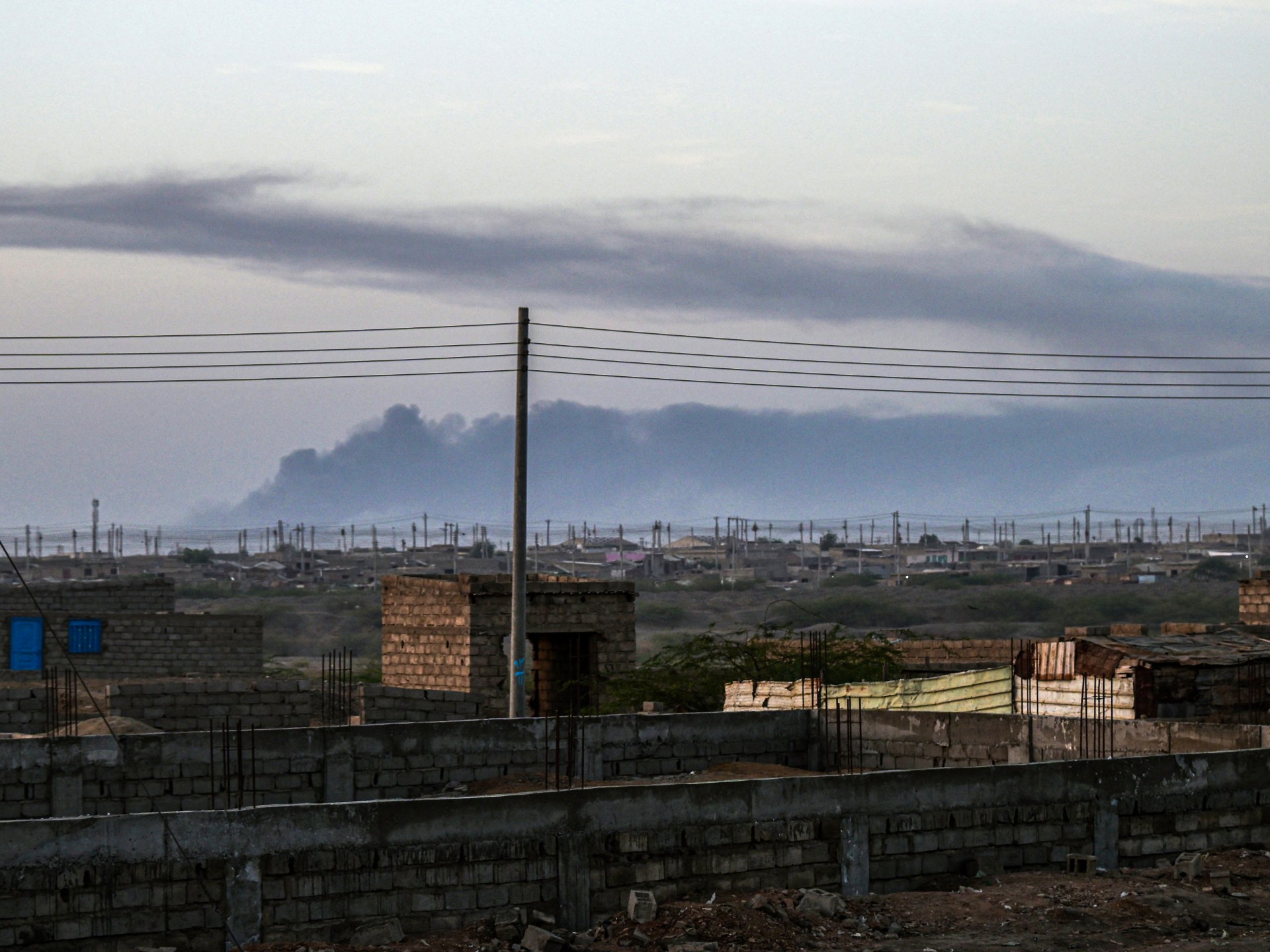
DEVELOPING STORYDEVELOPING STORY,
The army says an airbase, cargo warehouse and some civilian facilities were targeted in Port Sudan in the first RSF attack in the eastern city.
Sudan’s army says the paramilitary Rapid Support Forces (RSF) attacked a military airbase and other facilities in the vicinity of Port Sudan airport.
The army said on Sunday that the airbase was targeted using a drone, as well as a cargo warehouse and some civilian facilities, in the first attack in the eastern city by the RSF.
There are reports of some damage after drones hit an ammunition depot.
“Both the civilian and military airports are in the same place. What we know from residents in the port city is that five drones were launched by the RSF and targeted the airbase,” Al Jazeera’s Hiba Morgan said, reporting from the capital, Khartoum.
“There is a section of the airport that is for civilian flights, but there are military flights that land in the same airport. So, it’s not clear if the drones were targeting the military or civilian facilities or both,” she said.
“There are no reports of civilian casualties yet, and it’s not clear if the RSF was trying to target the fighter jet that was displayed in an air force show there on Saturday afternoon.”
A Sudanese passenger plane was redirected to Jeddah Airport after being unable to land at Port Sudan Airport, according to navigation data from Flight Radar.
The data showed that the plane took off from Dubai International Airport but had to change its route and make an emergency landing at King Abdulaziz International Airport. The plane performed a circular maneuver over the Red Sea before heading back towards Jeddah.
Sudan’s army and the RSF have been engaged in intense fighting since April 2023, with the war damaging the country’s infrastructure and displacing millions.
Middle East
Israeli soldiers, settlers harass Palestinian activist featured in BBC film | Israel-Palestine conflict News
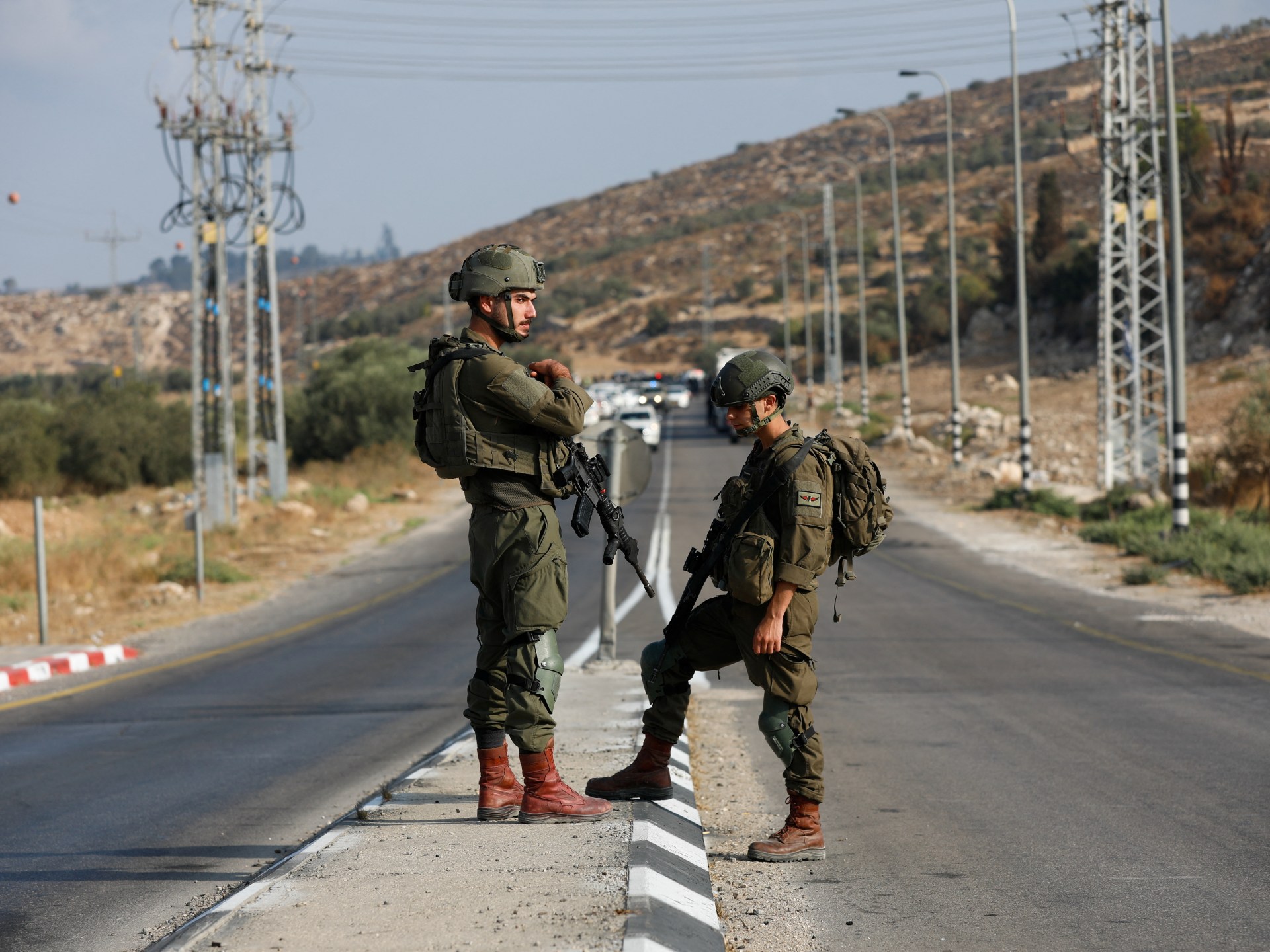
The activist says settlers feel emboldened by the unchecked support given to them by US President Donald Trump.
Israeli soldiers and settlers have harassed a Palestinian activist featured in a recent BBC documentary that has received praise for shedding light on the plight of Palestinians in the occupied West Bank.
As the world’s attention has been fixed on Israel’s 18-month war on Gaza, settler attacks against Palestinians in the West Bank and occupied East Jerusalem have spiked, forcing Palestinians to flee their homes. A lack of Israeli police action has further emboldened settlers, who cite the Torah in claiming rights over Palestinian lands.
Issa Amro, who was featured in The Settlers documentary made by British-American journalist and broadcaster Louis Theroux, released footage online showing how armed soldiers and settlers raided his house in Hebron in the occupied West Bank.
Amro said police also threatened him with arrest and told him not to file a complaint in what he said is another instance of apartheid imposed by Israel in the West Bank. Rights groups, including Human Rights Watch and Amnesty International, have accused Israel of practising apartheid in occupied territory.
Amro added on Sunday that the Israeli settlers who attacked him a day earlier told him United States President Donald Trump backed them. The settlers felt “emboldened because of the Trump administration’s blind support”, the activist said.
Theroux said he and his team have remained in regular contact with Amro.
. @Issaamro who featured in The Settlers has posted videos of his latest harassment by settlers and soldiers. Our team has been in regular contact with him since the documentary and over the last 24 hours. We are continuing to monitor the situation. https://t.co/asEWKkVX5h
— Louis Theroux (@louistheroux) May 4, 2025
The BBC documentary, a follow-up to Theroux’s 2012 film The Ultra Zionists, reflects on how the situation has evolved in occupied Palestinian territory.
While conducting interviews with Palestinian and Israeli figures, the documentary explored how the settler population has grown significantly and how new military outposts and Israeli infrastructure have expanded across Palestinian territories, often with direct state support.
It delves into the religious and ideological motivations behind the Israeli expansion, which has led to mass displacement of Palestinians and violent clashes, and it questions the legality and morality of the occupation as courts rule that it undermines international laws and norms.
“You bring Jewish families [to the occupied West Bank], you live Jewish life, and this will bring light instead of darkness. And this is how the state of Israel was established, and this is what we want to do in Gaza,” Daniella Weiss, a key member of the Israeli settler movement for decades, says in the documentary.
Weiss, who has enjoyed support from a number of Israeli rabbis as well, said Israeli Prime Minister Benjamin Netanyahu is “happy” about the settler expansion. Netanyahu has opposed the Palestinian sovereignty over Gaza and occupied West Bank and East Jerusalem.
Settlers are Israeli citizens who live on private Palestinian land in the West Bank and East Jerusalem. They now number more than 700,000. All Israeli settlements are considered illegal under international law.
Settlements and their expansions are seen as the biggest hurdle in the realisation of a sovereign and independent Palestinian state living side by side with Israel.
The United Nations General Assembly last year called on Israel to end its occupation of Palestinian territory. This came months after the International Court of Justice (ICJ) ruled that the Israeli presence in Palestinian territory is ‘”unlawful”.
Theroux himself was harassed as well when making part of the documentary in Hebron when Israeli soldiers approached him and tried to make him leave the area.
The harassment of Amro comes shortly after Hamdan Ballal, the Palestinian co-director of the Oscar-winning documentary No Other Land, was attacked by Israeli settlers in his home in the West Bank village of Susya.
Armed and masked settlers vandalised his home and vehicle in late March and injured Ballal. While receiving treatment in an ambulance, Israeli soldiers blindfolded and arrested the filmmaker, who was later released without charge.
Like the harassment of Amro on Saturday, that attack was also seen as retaliation for the documentary’s international acclaim and its efforts to show the struggles of Palestinians in the West Bank.
The incidents have also further highlighted the dangers faced by journalists and filmmakers under Israeli occupation at a time when Israel has killed more than 200 media workers in the Gaza Strip.
Middle East
Nearly 290,000 Gaza children on ‘the brink of death’ amid Israeli blockade | Israel-Palestine conflict News
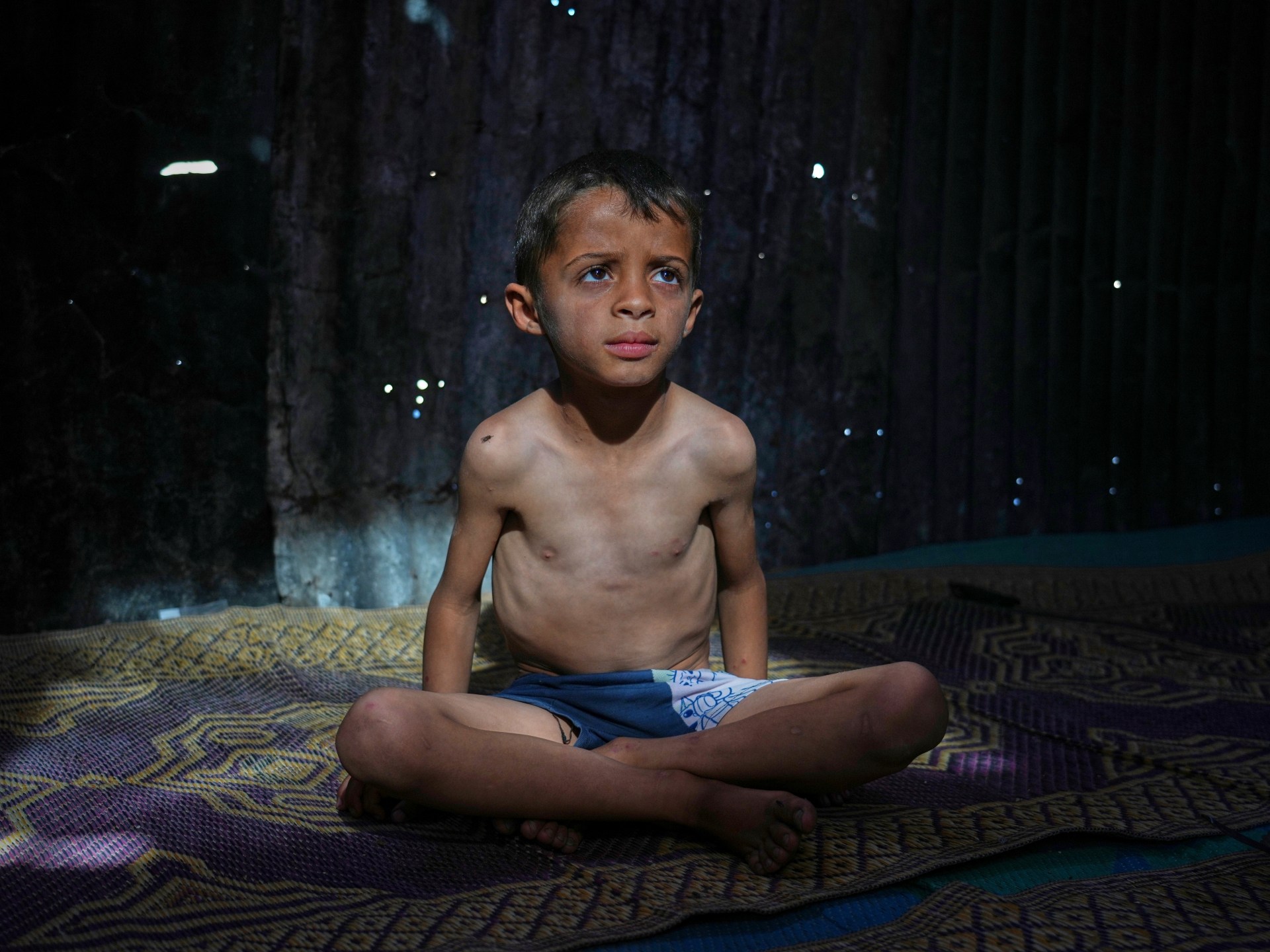
More than 3,500 children below the age of five years “face imminent death by starvation”, Gaza’s Government Media Office (GMO) has said, adding that some 70,000 children are being hospitalised in the enclave due to severe malnutrition amid more than two months of total Israeli blockade.
“Under this systematic blockade, more than 3,500 children under the age of five face imminent death by starvation, while approximately 290,000 children are on the brink of death,” the GMO statement on Telegram said on Sunday.
“At a time when 1.1 million children daily lack the minimum nutritional requirements for survival, this crime is being perpetrated by the ‘Israeli’ occupation using starvation as a weapon, amid shameful international silence,” it added.
At least 57 Palestinians have starved to death, causing global outrage, but that has failed to convince Israel to allow entry of aid into the enclave of 2.3 million people.
A shortage of food and supplies has driven the territory towards starvation, according to aid agencies. Supplies to treat and prevent malnutrition are depleted and quickly running out as documented cases of malnutrition rise.
The price of what little food is still available in the market is unaffordable for most in Gaza, where the United Nations says more than 80 percent of the population relies on aid.
Aid groups and rights campaigners have accused Israel of using starvation as a weapon of war.
Israel, for its part, insists the blockade is necessary to pressure Hamas to release the captives it still holds. Of the 59 captives still in Gaza, 24 are believed to be alive.
Israel’s war on Gaza has killed at least 52,495 Palestinians and wounded 118,366, according to Gaza’s Ministry of Health. The GMO updated the death toll to more than 61,700, saying thousands of people missing under the rubble are presumed dead.
Middle East
Are Yemen’s non-Houthi groups seeking US support to attack the Houthis? | Houthis
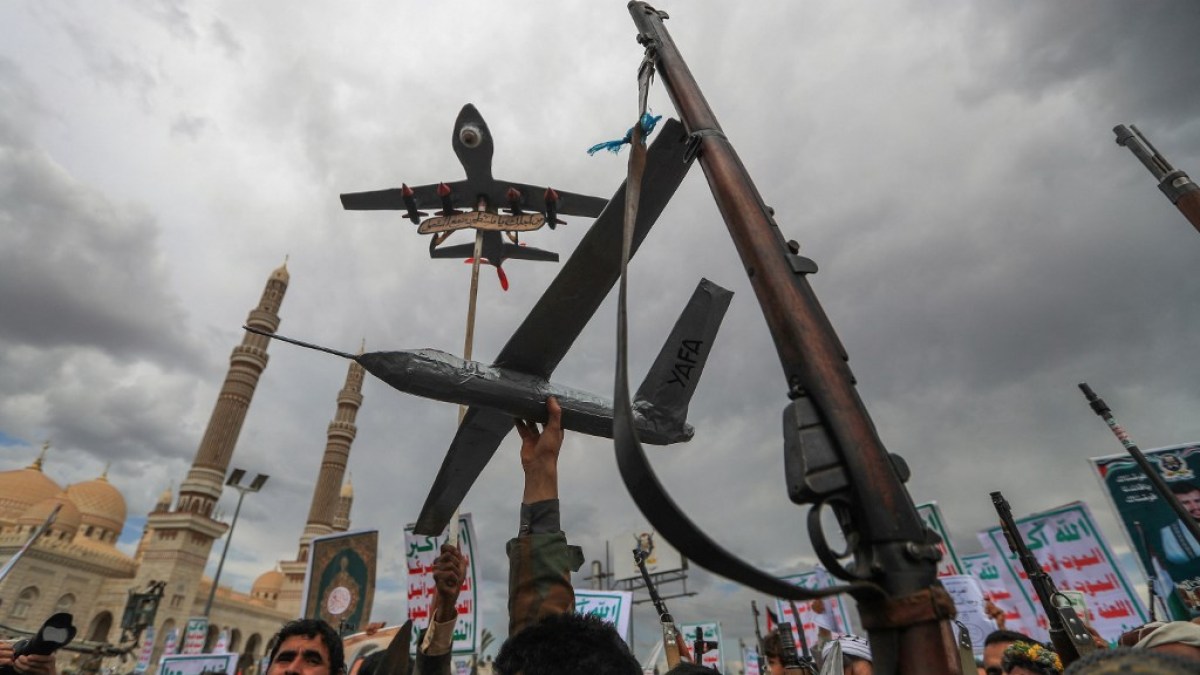
Anti-Houthi factions in Yemen could be vying for US support to attack the movement’s territory, analysts and experts told Al Jazeera, following intensified air strikes on Houthi targets by the United States.
The war in Yemen has largely been frozen for the last three years. Still, groups aligned with the Yemeni government have started signalling that they could launch operations against areas controlled by the pro-Iranian Houthis, including the crucial port of Hodeidah.
A similar campaign on Hodeidah, a critical entry point for food and goods on the Red Sea coast, seemed imminent in 2018, only to be aborted after intervention from the United Nations and the international community, who feared a humanitarian disaster in Yemen.
But experts and analysts expressed doubt that an attack by anti-Houthi groups on their domestic rival would be successful, despite some likening it to the offensive that unseated another Iran ally, former Syrian President Bashar al-Assad, in late 2024.

“Pro-ROYG [Republic of Yemen Government] voices have been asserting that ground operations against the Houthis – in Hodeidah and potentially elsewhere – are imminent,” Hannah Porter, an independent Yemen analyst, told Al Jazeera.
“My impression so far is that these comments are just meant to garner external support from the US or Saudi [Arabia] for a takeover of Hodeidah.”
Vying for US support
The Houthis, or Ansar Allah as they are officially known, marched into and took over the Yemeni capital Sanaa in 2014. Soon after, a Saudi Arabian-led coalition intervened on behalf of Yemen’s internationally recognised government to fight the Houthis.
Anti-Houthi forces achieved some success in the early years of the war, but the failed Hodeidah campaign seemed to slow their momentum, and the Houthis have largely been on top militarily since then.
Saudi Arabia announced in March 2022 that it would stop hostilities in Yemen, and a UN-brokered truce stopped much of the fighting the following month.
By then, the Houthis still controlled Sanaa and much of northwest Yemen, while various anti-Houthi groups held the key port city of Aden and much of southern and eastern Yemen.
The Yemeni government has undergone major changes in the past few years, with President Abd-Rabbu Mansour Hadi suddenly stepping down in 2022 and handing over power to an eight-member Presidential Leadership Council (PLC), which has, so far, proven ineffective.
PLC Prime Minister Ahmed Awad Bin Mubarak resigned on Sunday, claiming to have been blocked from fulfilling his duties, as reports circulated of conflicts between him and President Rashad al-Alimi and accusations of mission creep.
The PLC includes members who have previously fought against the Yemeni government. They include Aydarous al-Zubaidi, the head of the separatist Southern Transitional Council (STC), and Tareq Saleh, nephew of former President Ali Abdullah Saleh, a one-time ally of the Houthis.
But Houthi attacks on what they claim are Israeli-linked ships in the Red Sea, as well as attacks on Israel itself, have led to a bombing campaign against Yemen, and some anti-Houthi forces now see an opening.
“We’ve been seeing various anti-Houthi factions lobbying for US support since the start of the Gaza crisis,” Nick Brumfield, a Yemen expert, told Al Jazeera.
“Both the Yemeni government and the Southern Transitional Council have competitively sought to present themselves as the solution to the US’s need for a partner on the ground against the Houthis in Yemen.”

Plan versus reality
The Yemeni government has long emphasised that its ultimate goal is the defeat of the Houthis and an end to the group’s “coup” against the Yemeni state.
In early April, President al-Alimi spoke of the importance of national unity “to topple the coup”, adding that the “decisive hour” of the “battle for liberation” was drawing near.
Al-Alimi has not given any indication of when that battle against the Houthis would be, but forces under the umbrella of the Yemeni government may see the intensification of US air strikes under President Donald Trump’s administration.
The US claims the strikes targeted Houthi leaders and have significantly degraded Houthi capabilities. Houthi authorities say that at least 123 Yemenis have been killed in the strikes since they intensified in mid-March, many of them civilians.
Reporting from The Wall Street Journal (WSJ) and Bloomberg has claimed that discussions for an anti-Houthi ground operation, backed by the US, are under way.
The WSJ specifically mentioned that the United Arab Emirates had raised the plan with the US, but the UAE has denied any involvement, with Assistant Minister for Political Affairs Lana Nusseibeh calling them “wild unsubstantiated stories” on April 17.
The UAE officially withdrew its military forces from Yemen in 2019.

Tareq Saleh has been mentioned in news reports as a likely figure leading any anti-Houthi campaign on the Red Sea coast.
But, experts say, there has thus far been no noticeable mobilisation on the ground by anti-Houthi Yemeni armed groups.
“The PLC has been speaking about liberating Sanaa and such,” Raiman Al-Hamdani, a Yemen researcher with ARK, an international development company, told Al Jazeera.
“As far as I know, there has been little mobilisation towards this end. Whether they can is a very different story, especially with Saudi Arabia and the UAE no longer wanting to engage in war with the Houthis.”
After years of fighting, the Saudis and Houthis entered into ceasefire discussions in 2022, leaving anti-Houthi groups – including the Yemeni government – uncertain over their future and the Houthis further entrenched in power.
Al Jazeera reached out to the Yemeni government for comment on this story but received no response before publication.
Comfortable in the status quo
An advance on Sanaa, high up in the Yemeni mountains and closer to the Houthi heartland in Yemen’s far north, would be difficult for Yemeni government forces, and would involve a massive turnaround in fortunes, as well as turning Yemen’s most powerful tribes, many of whom currently back the Houthis.
The main target of any US-backed operation, however, would likely be Hodeidah, which lies on a coastal plain and whose population is less supportive of the Houthis. Losing Hodeidah, as well as other areas of the Red Sea coast, would still represent a significant loss for the Houthis and limit their ability to attack shipping on the vital sea route.
That would line up with the primary goal of the US to curtail the ability of the Houthis to attack regionally, even if the group were still able to launch missiles further afield.

But any effort to take Hodeidah would still likely require a fierce campaign, and thus far, no force – including the US – appears to be willing to fully back anti-Houthi forces militarily.
That is problematic for the anti-Houthi forces and potentially a non-starter, considering the Yemeni government’s inability to defeat the Houthis even when it had heavy military support from the Saudi-led coalition earlier in the war.
“The Houthis will throw all their weight behind defending Hodeidah,” Porter said. “Their port access is critical to their survival.”
She added that the Houthis were likely in a better military position to defend Hodeidah than any group attempting to advance on it.
“Honestly, I think the Republic of Yemen Government and the Presidential Leadership Council are not very invested in shifting the status quo,” Porter said.
“If there was a viable opportunity to take Hodeidah Port, then they would seize on that, but I don’t think they’ll have the support they need.”
-
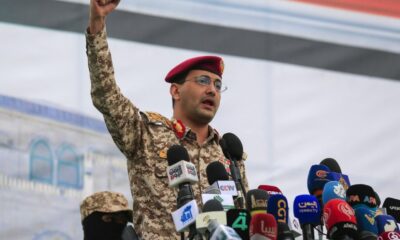
 Conflict Zones2 days ago
Conflict Zones2 days agoYemen’s Houthis launch missiles at Israel, army says it intercepts | Houthis News
-
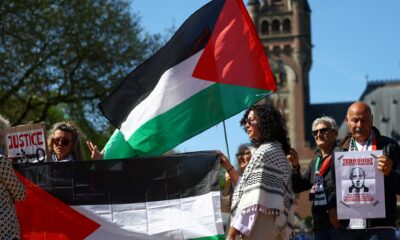
 Middle East2 days ago
Middle East2 days agoICJ hearing on Israel’s obligation to allow aid to Palestine: Key takeaways | Israel-Palestine conflict News
-
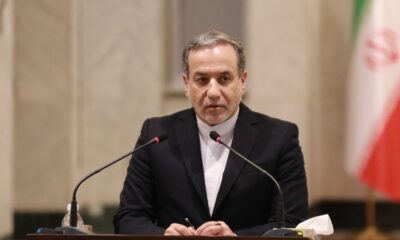
 Middle East22 hours ago
Middle East22 hours agoIran reasserts uranium enrichment rights as further US talks delayed | Nuclear Energy News
-

 Europe1 day ago
Europe1 day agoReform UK wins fifth seat in parliament by just six votes as populist party’s support strengthens
-
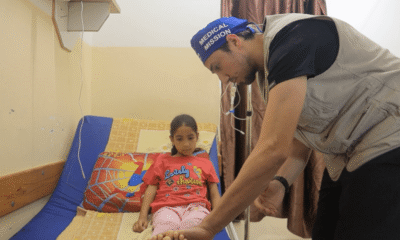
 Middle East1 day ago
Middle East1 day agoFear, pain, and a little hope: Volunteer doctors in Gaza | Israel-Palestine conflict News
-
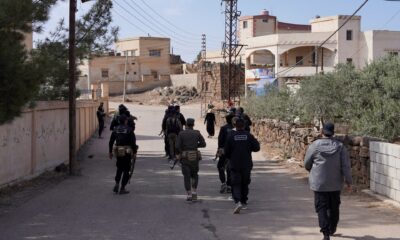
 Middle East1 day ago
Middle East1 day agoIsraeli attacks kill two more as Syria government reaches deal with Druze | News
-

 Africa2 days ago
Africa2 days agoLyoya shooting: Officer takes the stand
-
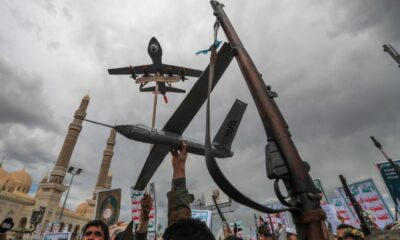
 Conflict Zones21 hours ago
Conflict Zones21 hours agoHouthis maintain pressure on Israel as US launches more strikes on Yemen | Politics News




